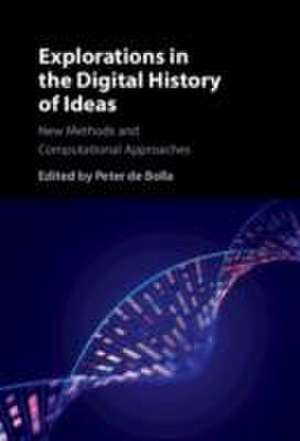Explorations in the Digital History of Ideas: New Methods and Computational Approaches
Editat de Peter de Bollaen Limba Engleză Hardback – 29 noi 2023
Preț: 640.78 lei
Preț vechi: 719.99 lei
-11% Nou
Puncte Express: 961
Preț estimativ în valută:
122.61€ • 128.34$ • 102.05£
122.61€ • 128.34$ • 102.05£
Carte tipărită la comandă
Livrare economică 31 martie-14 aprilie
Preluare comenzi: 021 569.72.76
Specificații
ISBN-13: 9781009263580
ISBN-10: 1009263587
Pagini: 300
Dimensiuni: 236 x 159 x 27 mm
Greutate: 0.59 kg
Editura: Cambridge University Press
Colecția Cambridge University Press
Locul publicării:Cambridge, United Kingdom
ISBN-10: 1009263587
Pagini: 300
Dimensiuni: 236 x 159 x 27 mm
Greutate: 0.59 kg
Editura: Cambridge University Press
Colecția Cambridge University Press
Locul publicării:Cambridge, United Kingdom
Cuprins
Part I. Computational Methodologies for the History of Ideas: 1. Introduction Peter de Bolla; 2. Distributional Concept Analysis and the Digital History of Ideas Peter de Bolla, Ewan Jones, Paul Nulty, Gabriel Recchia and John Regan; 3. Operationalizing Conceptual Structure Paul Nulty; Part II. Case Studies in the Digital History of Ideas: 4. The Idea of Liberty, 1600-1800 Peter de Bolla, Ewan Jones, Paul Nulty, Gabriel Recchia and John Regan; 5. The Idea of Government in the British Eighteenth Century Peter de Bolla, Ewan Jones, Paul Nulty, Gabriel Recchia and John Regan; 6. Republicanism in the Founding of America Peter de Bolla; 7. Enlightenment Entanglements of Improvement and Growth Peter de Bolla, Ryan Heuser and Mark Algee-Hewitt; 8. The Idea of Commercial Society: Changing Contexts and Scales John Regan; 9. The Age of Irritability Ewan Jones and Natalie Roxburgh; 10. On Bubbles and Bubbling: The Idea of 'The South Sea Bubble' Claire Wilkinson; 11. Embedded Ideas: Revolutionary Theory and Political Science in the Eighteenth Century Mark Algee-Hewitt; 12. Computing Koselleck: Modeling Semantic Revolutions, 1720-1960 Ryan Heuser.
Descriere
Explains how computational approaches to text mining can substantially increase the power of our understanding of ideas in history.
